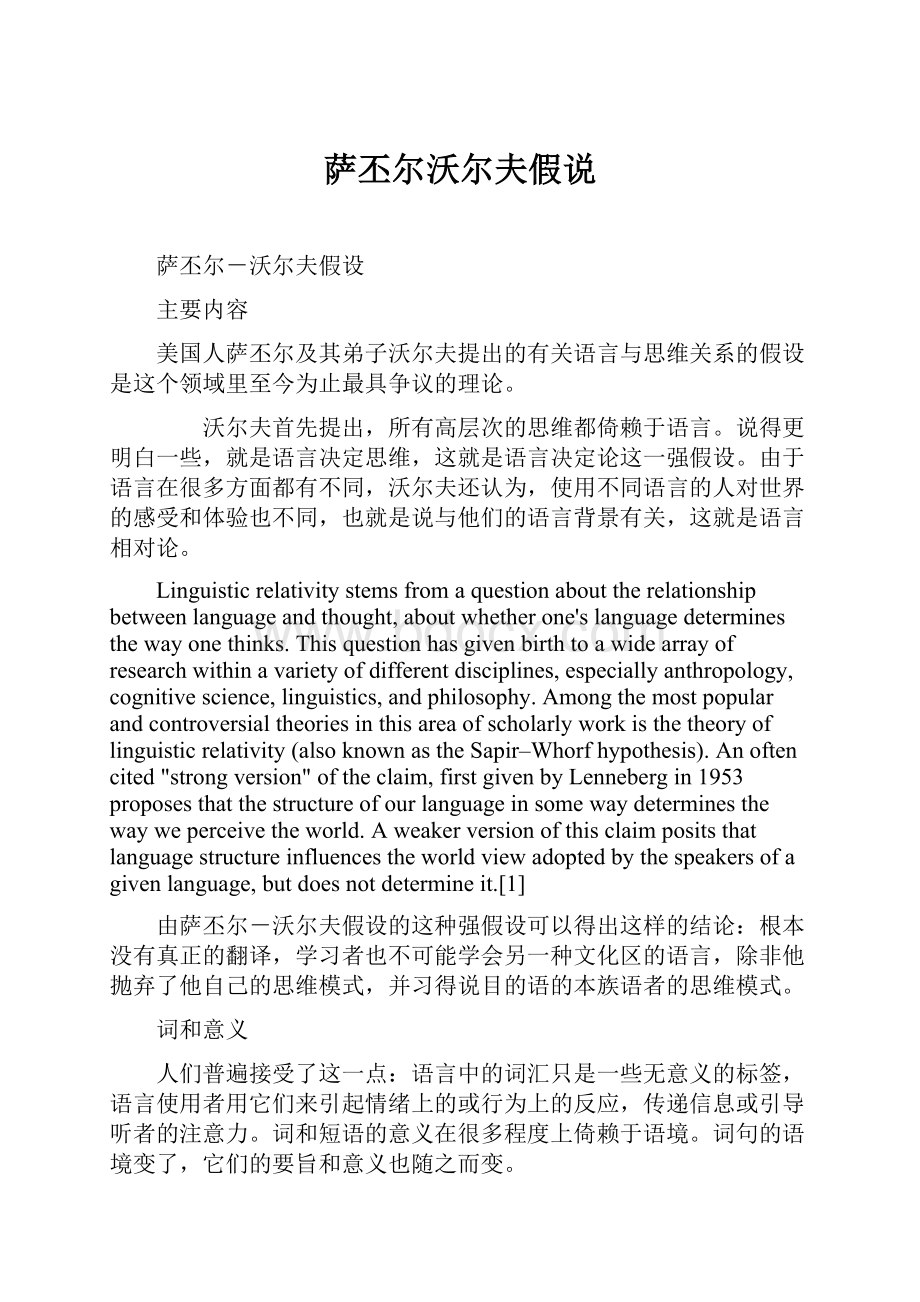萨丕尔沃尔夫假说.docx
《萨丕尔沃尔夫假说.docx》由会员分享,可在线阅读,更多相关《萨丕尔沃尔夫假说.docx(26页珍藏版)》请在冰豆网上搜索。

萨丕尔沃尔夫假说
萨丕尔-沃尔夫假设
主要内容
美国人萨丕尔及其弟子沃尔夫提出的有关语言与思维关系的假设是这个领域里至今为止最具争议的理论。
沃尔夫首先提出,所有高层次的思维都倚赖于语言。
说得更明白一些,就是语言决定思维,这就是语言决定论这一强假设。
由于语言在很多方面都有不同,沃尔夫还认为,使用不同语言的人对世界的感受和体验也不同,也就是说与他们的语言背景有关,这就是语言相对论。
Linguisticrelativitystemsfromaquestionabouttherelationshipbetweenlanguageandthought,aboutwhetherone'slanguagedeterminesthewayonethinks.Thisquestionhasgivenbirthtoawidearrayofresearchwithinavarietyofdifferentdisciplines,especiallyanthropology,cognitivescience,linguistics,andphilosophy.Amongthemostpopularandcontroversialtheoriesinthisareaofscholarlyworkisthetheoryoflinguisticrelativity(alsoknownastheSapir–Whorfhypothesis).Anoftencited"strongversion"oftheclaim,firstgivenbyLennebergin1953proposesthatthestructureofourlanguageinsomewaydeterminesthewayweperceivetheworld.Aweakerversionofthisclaimpositsthatlanguagestructureinfluencestheworldviewadoptedbythespeakersofagivenlanguage,butdoesnotdetermineit.[1]
由萨丕尔-沃尔夫假设的这种强假设可以得出这样的结论:
根本没有真正的翻译,学习者也不可能学会另一种文化区的语言,除非他抛弃了他自己的思维模式,并习得说目的语的本族语者的思维模式。
词和意义
人们普遍接受了这一点:
语言中的词汇只是一些无意义的标签,语言使用者用它们来引起情绪上的或行为上的反应,传递信息或引导听者的注意力。
词和短语的意义在很多程度上倚赖于语境。
词句的语境变了,它们的要旨和意义也随之而变。
语法结构
语言的句法系统和使用该语言的人的感知系统之间并没有萨丕尔-沃尔夫假设所声称的那种相互倚赖的关系。
语言的许多语法特征都纯粹是语言结构的表层现象。
翻译
对萨丕尔-沃尔夫假设的另一批判来自于语言间可以有成功的翻译这一事实。
我们可以用英语来解释如霍皮语这样的语言的概念上的独特性,这一事实可以证明翻译批判的观点。
第二语言习得
如果不同语言有不同的概念体系,那么说某种语言的人就会因为没有所需要的概念体系而无法学会另一种语言。
然而,由于人们可以学会完全不同的语言,因而这些语言不应该有不同的概念体系。
语言与世界观
语言体系并不一定能影响一个人对世界的看法。
一方面,说同一语言的人对世界可能有不同的看法,包括政治观点、社会观点、宗教观点、科学观点和哲学观点都可能有所不同。
另一方面,说不同语言的人也有可能有相似的政治观点、社会观点、宗教观点、科学观点和哲学观点。
另外,一种语言也可以描述对世界的多种不同的看法,这一点在成功的翻译作品中可以看得很清楚。
英文版
TheSapir-Whorfhypothesis
TheAmericananthropologist-linguistEdwardSapirandhisstudentBenjaminLeeWhorfproposedasweeping,two-prongedhypothesisconcerninglanguageandthought.
Whorfproposedfirstthatallhigherlevelsofthinkingaredependentonlanguage.Orputitmorebluntly,languagedeterminesthought,hencethestrongnotionoflinguisticdeterminism.Becauselanguagesdifferinmanyways,Whorfalsobelievedthatspeakersofdifferentlanguagesperceiveandexperiencetheworlddifferently,thatis,relativetotheirlinguisticbackground,hencethenotionoflinguisticrelativism.
Iffollowsfromthisstrongversionofthehypothesisthatthereisnorealtranslationandthatitisimpossibletolearnthelanguageofadifferentcultureunlessthelearnerabandonshisorherownmodeofthinkingandacquiresthethoughtpatternsofthenativespeakersofthetargetlanguage.
ArgumentsagainsttheSapir-Whorfhypothesis
Wordsandmeaning.Itiswidelyacceptedthatthevocabularyofalanguageconsistsofnothingmorethanmeaninglesslabelswhicharemanipulatedbylanguageuserstoelicitemotionalreactionsorbehavioralresponses,toimpartinformationortodirectthelistener'sattention.Themeaningofawordorphrasedependslargelyonthecommunicativecontext.Asthecontextofawordorsentencechanges,itseffectandmeaningalsochange.
Grammaticalstructure.ThesyntacticsystemofalanguageandtheperceptualsystemofthespeakersofthatlanguagedonothavethekindofinterdependentrelationshipthattheSapir-Whorfhypothesisclaimedtohave.Manygrammaticalfeaturesofalanguagearepurelysuperficialaspectsoflinguisticstructure.
Translation.Anothermajorargumentagainstthehypothesiscomesfromthefactthatsuccessfultranslationbetweenlanguagescanbemade.ThetranslationargumentissupportedbytheveryfactthatconceptualuniquenessofalanguagesuchasHopicannonethelessbeexplainedinEnglish.
Secondlanguageacquisition.Iflanguageshavedifferentconceptualsystems,thensomeonewhospeaksonelanguagewillbeunabletolearntheotherlanguagebecausehelackstherightconceptualsystem.However,sincepeoplecanlearnradicallydifferentlanguages,thoselanguagescouldn'thavedifferentconceptualsystems.
Languageandworldviews.Thelanguagesystemdoesnotnecessarilyprovidespecificsofone'sworldviews.Ontheonehand,peoplespeakingthesamelanguagemayhavedifferentworldviews,includingpolitical,social,religious,scientificandphilosophicalviews.Ontheotherhand,peoplespeakingdifferentlanguagesmaysharesimilarpolitical,social,religious,scientificorphilosophicalviews.Moreover,onelanguagecandescribemanydifferentworldviews,asisevidentinthecaseofsuccessfultranslation.
萨丕尔-沃尔夫假说是上个世纪语言学上具有重大意义的理论.萨丕尔-沃尔夫假说:
美国人类学家萨丕尔及其弟子沃尔夫提出的有关语言和思维的假设是最具争议的理论。
萨丕尔-沃尔夫假说有两个部分:
1语言决定论,即一个人的思维完全由母语决定,因为一个人只能根据其母语中编码设定的范畴和区别定义来认识世界;2语言相对论,即语言结构有无限的多样性,因此一种语言系统中所编定的范畴类别和区分定义为该语言系统所独有,与其他语言系统中所编定的范畴类别和区分定义不同。
Linguisticrelativity
FromWikipedia,thefreeencyclopedia
(RedirectedfromWhorf-Sapirhypothesis)
Theprincipleoflinguisticrelativityholdsthatthestructureofalanguageaffectsthewaysinwhichitsspeakersareabletoconceptualizetheirworld,.theirworldview.PopularlyknownastheSapir–Whorfhypothesis,orWhorfianism,theprincipleisgenerallyunderstoodashavingtwodifferentversions:
(i)thestrongversionthatlanguagedeterminesthoughtandthatlinguisticcategorieslimitanddeterminecognitivecategoriesand(ii)theweakversionthatlinguisticcategoriesandusageinfluencethoughtandcertainkindsofnon-linguisticbehavior.
Theideawasfirstclearlyexpressedby19thcenturythinkers,suchasWilhelmvonHumboldt,whosawlanguageastheexpressionofthespiritofanation.Theearly20thcenturyschoolofAmericanAnthropologyheadedbyFranzBoasandEdwardSapiralsoembracedtheidea.Sapir'sstudentBenjaminLeeWhorfcametobeseenastheprimaryproponentasaresultofhispublishedobservationsofhowheperceivedlinguisticdifferencestohaveconsequencesinhumancognitionandbehavior.HarryHoijer,oneofSapir'sstudents,introducedtheterm"Sapir–Whorfhypothesis",[1]albeitinfelicitouslyduetoSapir'snon-involvementwiththeideaandtheterm'smisleadinguseofhypothesisinacolloquial.non-scientific)sense.[2]Whorf'sideaswerewidelycriticized,andRogerBrownandEricLennebergdecidedtoputthemtothetest.TheyreformulatedWhorf'sprincipleoflinguisticrelativityasatestablehypothesisandconductedexperimentsdesignedtofindoutwhethercolorperceptionvariesbetweenspeakersoflanguagesthatclassifiedcolorsdifferently.Asthestudyoftheuniversalnatureofhumanlanguageandcognitioncameintofocusinthe1960stheideaoflinguisticrelativityfelloutoffavor.A1969studybyBrentBerlinandPaulKayclaimedtodemonstratethatcolorterminologyissubjecttouniversalsemanticconstraints,andhencetodiscredittheSapir–Whorfhypothesis.
Fromthelate1980sanewschooloflinguisticrelativityscholarshaveexaminedtheeffectsofdifferencesinlinguisticcategorizationoncognition,findingbroadsupportforweakversionsofthehypothesisinexperimentalcontexts.[3]Effectsoflinguisticrelativityhavebeenshownparticularlyinthedomainofspatialcognitionandinthesocialuseoflanguage,butalsointhefieldofcolorperception.Recentstudieshaveshownthatcolorperceptionisparticularlypronetolinguisticrelativityeffectswhenprocessedintheleftbrainhemisphere,suggestingthatthisbrainhalfreliesmoreonlanguagethantherightone.[4]Currentlyabalancedviewoflinguisticrelativityisespousedbymostlinguistsholdingthatlanguageinfluencescertainkindsofcognitiveprocessesinnon-trivialwaysbutthatotherprocessesarebetterseenassubjecttouniversalfactors.Currentresearchisfocusedonexploringthewaysinwhichlanguageinfluencesthoughtanddeterminingtowhatextent.[3]Theprincipleoflinguisticrelativityandtherelationbetweenlanguageandthoughthasalsoreceivedattentioninvaryingacademicfieldsfromphilosophytopsychologyandanthropology,andithasalsoinspiredandcoloredworksoffictionandtheinventionofconstructedlanguages.
Contents
[hide]
1History
oBenjaminLeeWhorf
oEricLenneberg
oTheuniversalistperiod
oFishman's'Whorfianismofthethirdkind'
oCognitivelinguistics
oPresentstatus
2Empiricalresearch
oColorterminologyresearch
3Linguisticrelativityandartificiallanguages
oProgramminglanguages
oExperimentallanguages
4Seealso
5Notes
6References
7Furtherreading
8Externallinks
[edit]History
Theideathatlanguageandthoughtareintertwinedgoesbacktotheclassicalcivilizations,butinthehistoryofEuropeanphilosophytherelationwasnotseenasfundamental.St.Augustineforexampleheldtheviewthatlanguagewasmerelylabelsappliedtoalreadyexistingconcepts.[5]Othersheldtheopinionthatlanguagewasbutaveilcoveringuptheeternaltruthshidingthemfromrealhumanexperience.ForImmanuelKant,languagewasbutoneofseveraltoolsusedbyhumanstoexperiencetheworld.Inthelate18thandearly19thcenturytheideaoftheexistenceofdifferentnationalcharacters,or"Volksgeister",ofdifferentethnicgroupswasthemovingforcebehindtheGermanschoolofnationalromanticismandthebeginningideologiesofethnicnationalism.
In1820WilhelmvonHumboldtconnectedthestudyoflanguagetothenationalromanticistprogrambyproposingtheviewthatlanguageistheveryfabric组织;体制ofthought,thatisthatthoughtsareproducedasakindofinnerdialogusingthesamegrammarasthethinker'snativelanguage.[6]Thisviewwaspartofalargerpictureinwhichtheworldviewofanethnicnation,their"Weltanschauung",wasseenasbeingfaithfullyreflectedinthegrammaroftheirlanguage.VonHumboldtarguedthatlanguageswithaninflectionalmorphologicaltype,suchasGerman,EnglishandtheotherIn